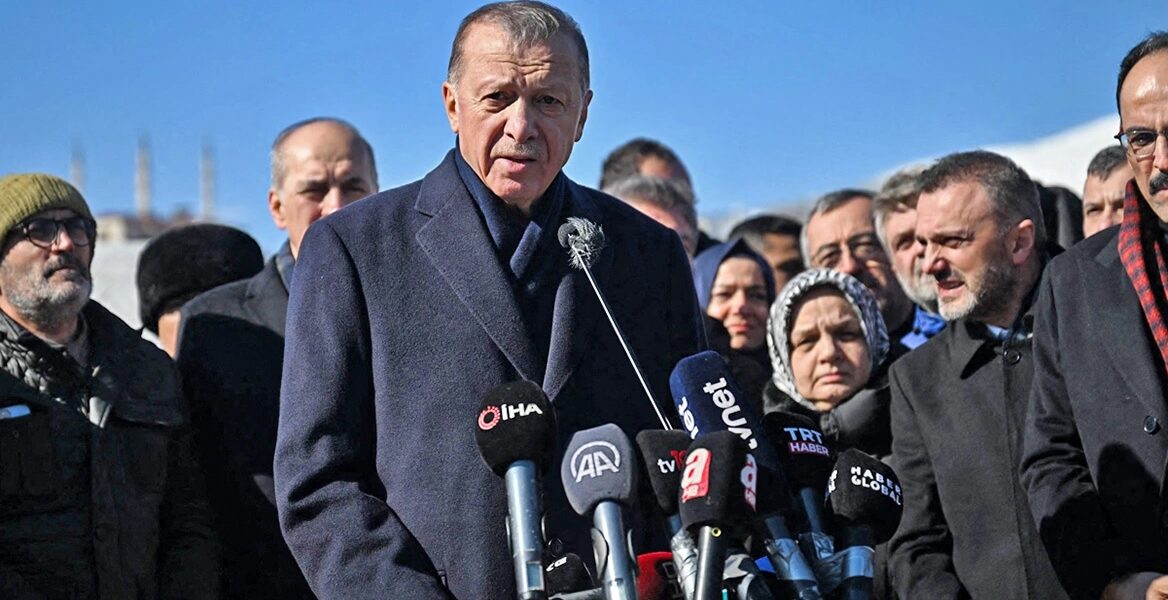Turkish President Recep Tayyip Erdoğan has reportedly opened a discussion with his staff about the date of the elections, after the devastating 7.8 Richter earthquake.
According to a report by the Hurriyet newspaper, the Turkish president appeared, at the last meeting, determined to hold elections on May 14, as he had initially announced. However, the party staff expressed the view that the elections should be pushed back and held on June 18.
The election date was tabled at a party meeting chaired by Erdoğan on Wednesday.
Reportedly, it was discussed that if the elections were held on May 14, there may be some difficulties in the preparation of the electoral rolls due to the work of removing the debris in the earthquake-prone, a process which may take a long time.
On the other hand, if they are moved to June 18 and given that this date coincides with the Islamic pilgrimage period, about 100,000 people will not be able to vote, while even if there is a 2nd round, it may fall within the Muslim religious festival, Eid al-Adha.
Furthermore, it became known that Erdoğan will also have a meeting with Devlet Bahçeli and the deputy presidents of the party group, in order to discuss the crucial issue of the date of the elections.
Runaway inflation, alongside a lira that has been in an accelerating downward spiral for years, has left the majority of Turks struggling to cover food, electricity, and housing costs.
“The election outlook before the earthquake was neck and neck,” said Yusuf Erim, Turkey analyst at TRT World. “It was shaping up to be one of the tightest presidential races in Turkish history.”
Erdoğan, an experienced and shrewd political operator, wasn’t sitting passively in the face of the electoral headwinds.
“He initiated the election economy,” said Hay Eytan Cohen Yanarocak, a Turkey scholar at the Jerusalem Institute for Strategy and Security.
The Turkish president allowed millions of workers below retirement age to begin collecting pensions, doubled the minimum wage, advanced a debt relief bill, and even announced that 10,000 suspended driver’s licenses would be returned.
“He did everything possible to attract the attention of the masses,” said Cohen, “to give the impression that the state is providing welfare to the people.”
Erdoğan’s massive spending program began to pay off. In early February, polls showed support for him reaching a two-year high.
“This earthquake shook all his programs, all of his plans,” said Cohen.
“The earthquake has become the only agenda in Turkey and will probably dominate the domestic discussion for the foreseeable future,” said Erim.
“For now the criticism comes from the same quarters that already opposed Erdogan,” said Gallia Lindenstrauss, a senior research fellow at the Institute for National Security Studies in Tel Aviv.
“The nation is in shock still, so it’s hard to know where it will develop.”
All politicians “will be judged on what they do over the next three months,” said Erim.
Erdoğan might even have an advantage over opposition rivals, because if he handles reconstruction competently, he’ll be able to point at tangible results.
He has promised to build homes for the millions left without roofs over their heads within a year. In the meantime, Turkish university students are back to learning remotely as their dorms have been allotted by Erdoğan to the earthquake victims.
Turkish authorities have also issued over 100 arrest warrants over building violations.
Erdoğan benefits from the fact that the opposition has yet to agree on a candidate, and pushed off their deadline to come to an agreement because of the quake.
READ MORE: The three Greek volunteers arrested in Turkey are returning to Greece.


